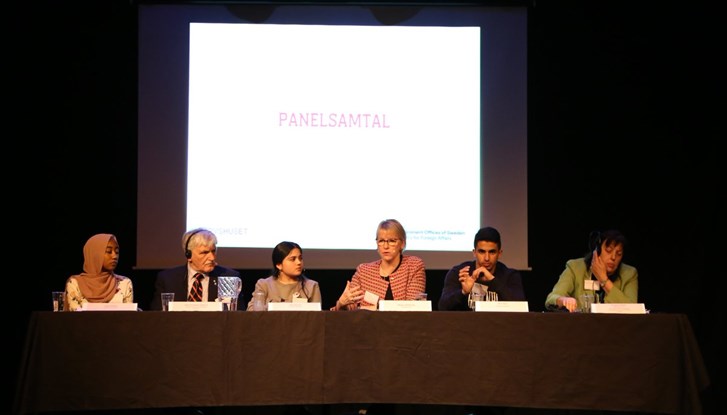Sweden arranges children consultations around the world to listen to children’s own stories and highlight children’s rights in armed conflict. On 22 March, a Child Forum was held at Fryshuset during which high-level guests – United Nations Secretary-General’s Special Representative for Children and Armed Conflict,Virginia Gamba, and Lieutenant-General Roméo Dallaire – participated together with some 60 children to further highlight and deepen knowledge on children and armed conflict.

War and armed conflict entail devastating consequences for individuals and whole communities. And those who are most defenceless in an armed conflict are children. More than 250 million children around the world are today affected by armed conflict. Some 125 million children are directly affected.
In the 2017 Annual Report of the Secretary-General on Children and Armed Conflict, which is based on data from 2016, more than 2 000 children in Syria and Iraq were verified as being killed. In Yemen, 502 children were killed in the same year. In Myanmar, 730 children are thought to have been killed between August and September 2017. Because access to Rakhine State in Myanmar has been denied, the exact number of children killed is unknown. These are a few examples from some of the currently ongoing conflicts.
Taking as its starting point the protection of children, respect for the Convention on the Rights of the Child and international humanitarian law, and the six grave violations against children in armed conflict identified by the UN, Sweden’s work on children and armed conflict is guided by four priorities, not least in the Security Council Working Group on Children and Armed Conflict, of which Sweden is Chair in 2017–2018. These are: implementing the UN’s children and armed conflict agenda, children’s right to have their voices heard, children’s right to education, and children’s right to health, including mental health.
In the Security Council, Sweden has consistently raised the vulnerable situation of children in armed conflict. We have also advanced the positions on the protection of children and their rights including by presenting a proposal that was unanimously adopted by the Security Council at the 2017 open debate on children and armed conflict.
Part of the work on children and armed conflict includes children consultations around the world. How do children experience conflicts? How do conflicts affect them? What do children require during and following conflict? This is one of Sweden’s priorities that provides an opportunity for children’s voices to be heard by decision-makers, civil society organisations and other adults. Last autumn, Sweden organised children consultations in Lebanon and Colombia. The focus then was refugee children and children in peace processes. This work is also continuing in 2018.
The Swedish public is of course interested in learning what Sweden is doing for children in armed conflict. Moreover, in our increasingly globalised world, children in Sweden are affected by events all around us. Perhaps without realising it, we actually have the whole world here with us. It is therefore time to take home the issue of children and armed conflict from UN Headquarters and the rest of the world, if only for a little while.
War and conflict are not far away. Children here in Sweden may have their own experiences of war, or have a classmate who has previously witnessed gunfire when their school was attacked. Another child may have parents who have fled from an armed conflict, or just have thoughts and feelings about what is shown on the news every day. Over the years, Sweden has also participated in various peacekeeping missions around the world. Right now, we are in Mali together with the UN, in Afghanistan with NATO, and in Iraq. All this makes it important to highlight the question of children and armed conflict at home, too.
Regardless of whether or not they have direct or indirect experience of armed conflict, children have different experiences and strong opinions. Their voices must count. The children consultations are a barometer of how children experience armed conflict. They provide adults with recommendations and become a tool to increase the protection of those with most need of protection in an armed conflict.
Ahead of the upcoming presidency of the UN Security Council, which begins in July 2018, we are arranging a Child Forum at Fryshuset. With a focus on Swedish priorities, children in the Child Forum are given the opportunity to put forward their perspectives and thoughts on children and armed conflict. In the long run, we hope that this gives children the opportunity to influence debates and decisions – not least as future decision-makers.
We cannot afford more lost generations of children being deprived of their right to life, to education, who are orphaned, injured and traumatised as a result of armed conflict. Their lives and rights cannot wait for the conflicts to end, we must act now. If we protect children today, we can prevent conflicts tomorrow.
Margot Wallström